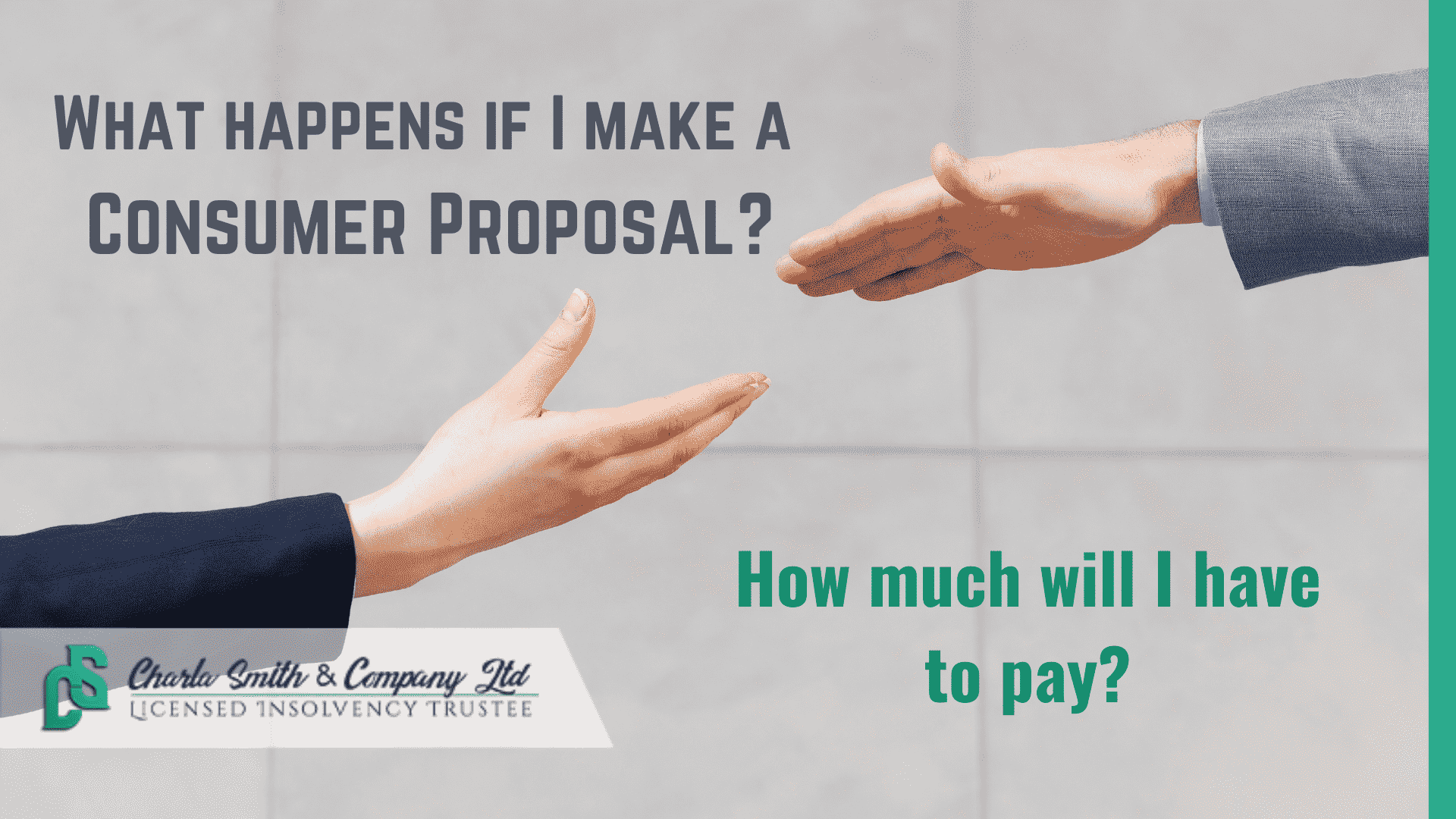
A Consumer Proposal is an agreement you make with your creditors to allow you more time to pay your debt, and often allows you to pay only a fraction of that debt while the rest is forgiven. For some, this sounds too good to be true.
It’s not.
But there are some things you’ll need to know before you decide to go this route. A Licensed Insolvency Trustee (or LIT), the only party who can administer a Consumer Proposal, will meet with you before you file a proposal and make sure you’re aware of how it will impact you, which can be highly dependent on your situation. In this blog series we aim to help you with some information to determine if it’s worth exploring a Consumer Proposal.
Often when an individual is considering their options, they’re concerned about how much a Consumer Proposal will cost them. The short answer is: it depends. Read on for the long answer…
It truly does depend
It’s impossible to tell someone how much they’ll have to pay in a Consumer Proposal without first investigating their personal and financial situation. Any person or website that gives you a dollar amount or a percentage of your debt that you’ll have to pay, without first conducting such an investigation, is simply not a credible source. A credible source might say something like “it is possible for you to obtain relief from your debt by paying just 20% of the amount you owe”, which is true because it is possible, but it may turn out not to be possible for you, depending on your circumstances.
The fact is, amount you’ll have to pay to make a successful proposal depends on a lot of things, including:
- The value your assets
- How much income you earn
- How many people live in your household
- The amount of debt you owe
- Who your creditors are
- Who you engage to help you file a proposal
Even after reviewing this information, it’s impossible for an LIT to give you a definitive number that you'll have to pay, as it’s not the LIT who decides. A Consumer Proposal is a negotiation between you and your creditors, with the LIT essentially playing the mediator. Whatever you offer, your creditors have he ability to accept it, reject it, or ask for more. That said, an LIT provides guidance on what to offer based on the factors mentioned above.
How do these factors affect how much you have to pay?
1. The value of the assets you own
Your creditors will expect your proposal to pay them at least what they'd get if they hired a lawyer to sue you and seize your assets, or if you filed a bankruptcy. In either of those cases, if you own any assets that are not protected according to provincial laws, they’d get the value of those assets (after deducting what you owe to secured creditors, like a mortgage company). The LIT will calculate this value and include it in the amount you have to pay.
2. How much income you earn
To ensure you’re offering your creditors at least what they’d get if you filed a bankruptcy, the LIT reviews your income to determine if you would have to make “surplus income” payments if you filed a bankruptcy. Surplus income occurs when you earn more than the federal government says you require to cover your basic expenses. So the more you make, the more you have to pay in a Consumer Proposal.
3. How many people live in your household
If there are others in your household who are earning money, or alternatively are dependent on you to support them, this will impact the amount of “surplus income” you'd have. Depending on the number of people and how much they earn, this could either increase or decrease the amount you have to pay.
4. The amount of debt you owe
Your creditors typically want to see a reasonable amount of their debt paid in a proposal, no matter your assets or income. So even if you’re offering more than they’d get otherwise, your creditors might not be willing to accept a Consumer Proposal if you’re only paying a tiny percentage of their debt. Therefore, the more you owe, the more you usually have to pay.
5. Who your creditors are
Some creditors are less willing to consider a Consumer Proposal, particularly one that’s offering significantly less than full payment. This is often due to their internal policies, although those policies can change over time. LITs have experience dealing with a wide range of creditors, including banks and credit card companies and even Canada Revenue Agency, so they’ll have a good idea of what each creditor might require to convince them to approve your proposal. As such, the LIT may recommend you offer more or less than a person in similar circumstances who owes money to different creditors.
6. Who you engage to help you file a proposal
When you file a Consumer Proposal with an LIT (which is a requirement, as only LITs can administer Consumer Proposals), the LIT’s fee is paid (deducted) out of the money you’re offering to pay your creditors. The amount they’re paid is a standard, government-set, calculation, so generally speaking the fees of one LIT or another will be the same for the same proposal, but it'll typically always be coming out of the amount you and your creditors have agreed you’ll pay.
However, if you first approach a debt consultant to discuss your Consumer Proposal, they’ll charge you a separate fee for their advice and assistance, which you pay directly to them. They’ll then refer you to an LIT to administer the proposal. So you’ll pay more overall in fees by starting with a debt consultant than if you approach an LIT directly. Some debt consultants claim that you’ll pay less overall if you engage them for advice, as they say they can negotiate a lower Consumer Proposal payment. While they certainly may advocate for you to pay less than the LIT would have recommended, keep in mind that it is still up to the creditors to decide whether to accept your offer. The debt consultant does not deal directly with the creditors, so their assistance is not guaranteed to result in you paying less to your creditors.
How to figure out what you'd have to pay
All of the above information, and any other relevant factors unique to your situation, will be factored into the amount you have to pay. When you’re considering making a proposal to your creditors, an LIT will estimate the amount you’ll have to pay, but the ultimate decision is up to your creditors. It’s not always easy to predict how some creditors will respond, but the LIT’s analysis and experience will help you come up with a good offer, and the LIT will provide a report to your creditors explaining the offer and why they’d recommend the creditors accept it.
To figure out what you’d have to pay in a Consumer Proposal, your best bet is to make an appointment for a consultation with an LIT. Most LITs offer free consultations so you can figure out what your options look like without having to pay for their advice.
Frequently Asked Questions
Q. Where can I find more information about a Consumer Proposal?
Check out our Consumer Proposal page, or contact us for a free consultation.
Q. How can I find out whether a Consumer Proposal is the right option for settling my debt?
Check out our blog post that explains about options for settling your debt, or contact us for a free consultation.
Q. How do the cost of a Consumer Proposal and a bankruptcy compare?
The cost of a bankruptcy is determined based on many of the same factors we've discussed above. However, you typically pay less in a bankruptcy than you would in a Consumer Proposal, because your creditors don't have as much ability to impact your payments in bankruptcy. For more information about how these options compare, reach out to us for a free consultation.
CHARLA SMITH & COMPANY LTD.

Let us help you get relief from the burden caused by your debt. As a Licensed Insolvency Trustee, Charla Smith & Company are highly trained and experienced in debt relief solutions, and we take great pride in identifying the option that's the best fit for your unique situation. From advice on talking to your creditors to consumer proposals to bankruptcy and everything in between, we’re here to answer questions, guide and advise you so you can take back control of your financial situation. Serving Calgary, AB and surrounding areas.
YOUR TRUSTED CHOICE FOR DEBT RELIEF
With our experience and our caring approach, we will help you find the best option for debt relief based on your unique situation - from advice on talking to your creditors to a consumer proposal or bankruptcy, and everything in between. We are here to lift the burden caused by overwhelming debt.
Contact us today at 1-403-899-3890 for a FREE, confidential, no-commitment meeting, and let us guide you to regaining your financial footing.
